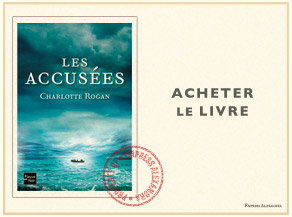Publisher’s Summary
In the summer of 1914, a twenty-two-year-old woman named Grace elopes to London with Henry Winter, hoping to escape the disapproval of his wealthy family. When the elegant ocean liner carrying them home to America suffers a mysterious explosion, Henry sacrifices his own safety and secures Grace a seat in a lifeboat, which its occupants quickly realize is over capacity. As supplies dwindle and the weather deteriorates, it becomes increasingly apparent that for any to live, some must die.
The castaways scheme and battle, caught up in a vicious power struggle between a ruthless but experienced sailor and an enigmatic matron with surprising powers of persuasion. Grace, who has made her way in the world by seizing every possible advantage, knows that choosing a side will seal her fate. As she recollects the unorthodox way she and Henry met and considers the new life of privilege she thought she’d found, she must now decide: Will she pay any price to keep it?
The Lifeboat was nominated for the Guardian first book award, the International IMPAC Dublin Literary Award, and the Goldsboro Books and Historical Writers Association debut historical fiction prize. It was included on The Huffington Post’s 2015 list of “21 books from the last 5 years that every woman should read,” is in development as a motion picture starring Anne Hathaway, and has been translated into 26 languages.
Advance Praise
“The Lifeboat traps the reader in a story that is exciting at the literal level and brutally moving at the existential. I read it in one go.”
—Emma Donoghue, author of New York Times bestseller Room
“Charlotte Rogan uses a deceptively simple narrative of shipwreck and survival to explore our all-too-human capacity for self-deception.”
—JM Coetzee, winner of the Nobel Prize in Literature and author of Waiting for the Barbarians
“What a splendid book. It rivets the reader’s attention, and at the same time it seethes with layered ambiguity.”
—Hilary Mantel, Booker Prize-winning author of Wolf Hall
“The Lifeboat is a spellbinding and beautifully written novel, one that will keep readers turning pages late into the night.”
—Tim O’Brien, author of The Things They Carried
“The Lifeboat is a richly rewarding novel, psychologically acute and morally complex. It can and should be read on many levels, but it is first and foremost a harrowing tale of survival.”
—Valerie Martin, winner of the Orange Prize for Property
Excerpt from The Lifeboat
The below text from The Lifeboat is also available for download as a PDF here.
Today I shocked the lawyers, and it surprised me, the effect I could have on them. A thunderstorm arose as we were leaving the court for lunch. They dashed for cover under the awning of a nearby shop to save their suits from getting wet while I stood in the street and opened my mouth to it, transported back and seeing again that other rain as it came at us in gray sheets. I had lived through that downpour, but the moment in the street was my first notion that I could live it again, that I could be immersed in it, that it could again be the tenth day in the lifeboat, when it began to rain.
The rain had been cold, but we welcomed it. At first it had been no more than a teasing mist, but as the day progressed, it began to come down in earnest. We held our faces up to it, mouths open, drenching our swollen tongues. Mary Ann could not or would not part her lips, either to drink or to speak. She was a woman of my age. Hannah, who was only a little older, slapped her hard and said, “Open your mouth, or I’ll open it for you!” Then she grabbed Mary Ann and pinched her nostrils until she was forced to gasp for air. The two of them sat for a long time in a sort of violent embrace while Hannah held Mary Ann’s jaws open, allowing the gray and saving rain to enter her, drop by drop.
“Come, come!” said Mr. Reichmann, who is the head of the little band of lawyers hired by my mother-in-law, not because she cares one jot about what happens to me, but because she thinks it will reflect badly on the family if I am convicted. Mr. Reichmann and his associates were calling to me from the sidewalk, but I pretended not to hear them. It made them very angry not to be heard or, rather, not to be heeded, which is a different and far more insulting thing, I imagine, to those used to speaking from podiums, to those who regularly have the attention of judges and juries and people sworn to truth or silence and whose freedom hangs on the particular truths they choose to tell. When I finally wrenched myself away and joined them, shivering and drenched to the bone but smiling to myself, glad to have rediscovered the small freedom of my imagination, they asked, “What kind of trick was that? Whatever were you doing, Grace? Have you gone mad?”
Mr. Glover, who is the nicest of the three, put his coat around my dripping shoulders, but soon the fine silk lining was soaked through and probably ruined, and while I was touched Mr. Glover had offered his coat, I would much rather it had been the coat of the handsome, heavyset William Reichmann that had been ruined in the rain.
“I was thirsty,” I said, and I was thirsty still.
Reviews
“Impressive, harrowing first novel…Rogan writes viscerally about the desperate condition of the castaway…But it’s her portrait of Grace, who is by turns astute, conniving, comic and affecting, that drives the book.”
—New York Times
“By some way the most gripping debut of 2012 I’ve read.”
— The Sunday Times
“Rogan has written a layered and provocative tale of survival and impossible decisions. But her biggest achievement is the disarmingly demure yet fiercely shrewd Grace, a narrator as fascinating and unreliable as they come.”
—Entertainment Weekly
“A strangely wonderful book, like Moby Dick retold by Dorothy L. Sayers.”
—The Spectator
“Rogan has written an eerie, powerful debut you’ll want to race through, but try to resist the urge. A slower read reveals a psychological depth that’ll leave you thinking.”
—People
“A daring, imaginative tour de force.”
—The Independent
“Other novels have examined the conscience and guilt of a survivor among the dead, but few tales are as thoughtful and compelling as this.”
—Washington Post
“An enthralling story of survival at sea…One hell of a debut.”
—The New York Review of Books
Honors and Lists
Barnes and Noble Discover Great New Writers selection for spring, 2012
Waterstones 11 Choice for 2012
Long-listed for the Guardian first book award
Nominated for the International IMPAC Dublin Literary Award
Short-listed for the Goldsboro Books/Historical Writers Association debut historical fiction prize
A New York Times bestseller
The Huffington Post, 2015: 21 Books From The Last 5 Years That Every Woman Should Read
The Guardian: Books of the year for 2012
The Globe and Mail: Top 29 picks for international fiction of 2012
BookPage: Best books of 2012
The Independent: Books of the Year 2012: Literary fiction
NPR: Best Books of 2012: The Complete List
The Wall Street Journal asks 50 “friends” to select their favorite reads of 2012; Hilary Mantel chooses The Lifeboat
The San Francisco Chronicle: Best Books of 2012: 100 recommended books
The Guardian: Your books of the year–Guardian readers pick their favorite books of 2012
denverpost.com: 2012’s memorable books
The Globe and Mail: 45 notable book-lovers share their best reads of the year
Salt Lake County Library System: Nominated for reader’s choice awards
Reading Guide for The Lifeboat
The below text from The Lifeboat is also available for download as a PDF here.
WARNING: Some questions contain SPOILERS.
- In disaster situations, is it right to save women and children first? What moral justifications exist for your answer?
- Discuss the thought experiment referred to in Grace’s trial, also known as “The Plank of Carneades.” Is either the first or second swimmer to reach the plank justified in pushing the other swimmer away?
- What do you think of the concept of necessity as a justification for behavior that would not be condoned in ordinary circumstances?
- If you were to ask Grace what qualities she looks for in a friend, what would she say? What would the truth be?
- Which characters, in your opinion, hold the moral high ground?
- Seventeenth-century political philosophers Thomas Hobbes and John Locke postulated that humankind started off in a state of nature and gradually gave up certain freedoms in return for security, an exchange sometimes called the social contract. How does the lifeboat approximate a state of nature? Does survival in such a state require giving up personal freedom and autonomy?
- Some modern writers assert that the advances in opportunities for women have been predicated on the requirement that women become more like men. Do you agree with this?
- Are people more likely to revert to traditional male/female roles in crisis situations? What traditional male/female traits might help a person survive?
- Author Warren Farrell, who writes about gender issues, has said: “Men’s weakness is their façade of strength; women’s strength is their façade of weakness.” Does this hold true for the characters in The Lifeboat?
- In his book In the Heart of the Sea: The Tragedy of the Whaleship Essex, Nathaniel Philbrick argues that an “authoritarian” leadership style is useful in the early stages of a disaster, but a “social” style becomes more important over time. Does this dynamic fully explain the power struggle in Lifeboat 14 or were other forces at work?
- Does power always involve the threat of coercion? Besides violence, what forms of power influence the characters in The Lifeboat?
- The first thing a person says is often more honest than later explanations. Are there instances in the book where a character’s early words are a clue to assessing the truth of a particular situation or incident?
- Do you think Mr. Hardie stole or helped to steal anything from the sinking Empress Alexandra? Would this have been wrong, given that any valuables were destined to be lost forever?
- Should Grace have been acquitted of Mr. Hardie’s murder?
- Comment on the use of storytelling in the novel. Does your answer shed any light on Grace’s own story?



